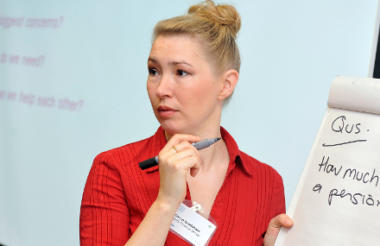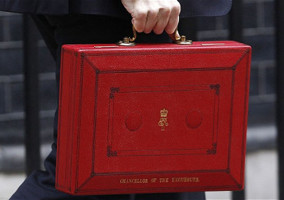Charities have criticised the Chancellor, Philip Hammond, for appearing to ignore the sector in today’s Autumn Statement.
Acevo and the Charity Finance Group were among those to criticise the lack of attention to the charity sector in today’s announcements, while NCVO warned that the sector needed to be ready for tougher times to come.
Social care charities are frustrated that there was no extra funding for social care.
CFG: ‘There isn’t a lack of money, there is simply a lack of political will’
CFG said the lack of anything for the charity sector indicated that there is a “lack of political will” to support the sector, and called for support from funders to help charities affected by the National Living Wage.
Caron Bradshaw, chief executive, said: “This Autumn Statement must mark the end of the mantra that “there is no money left” and that charities should be happy with their lot. We have seen tens of billions promised in infrastructure spending, business rate cuts and personal tax cuts. Most of this has been financed by greater levels of borrowing. There isn’t a lack of money, there is simply a lack of political will to support the valuable work of our sector.
“There are some helpful policies in the form of the freeze in fuel duty as well as more Libor giveways. But it is clear that we are not high enough up the new government’s agenda. We need to rectify that in time for next ‘Spring Statement’ – otherwise there is a danger that more opportunities will be missed.
“Funders, particularly in government, also must not ignore the creeping costs for charities in delivering services through rises in the National Living Wage. The NLW is a good policy, but if funders do not provide money to cover its costs, then it could having a negative impact on service provision. Businesses have received additional support through tax cuts, our sector should be similarly supported.”
Acevo: ‘Lack of support for social care and the voluntary organisations is regrettable
Acevo said it was concerned that the government seemed to have ignored the sector and criticised it for ignoring its own guidelines post-Kids Company.
Interim chief executive, Asheem Singh, said: “This was a sticking plaster autumn statement. The economic forecasts cast a prolonged gloom over our economy and society and there was no sense of a vision to bring the public services on which we depend out of the other side.”
On the Libor awards he said: “Investment in our charities is welcome. But in its latest Libor giveaway the government has ignored its own post-Kid Company guidelines on good grant making. Good causes are being served badly and there is a real question about whether this annual giveaway to various pet projects really is in the public’s best interest
“Had the government chosen to deploy this money towards investment in the quality and support of charity governance it would have demonstrated that it has learned the lessons of Kids Company, lessons that cannot be ignored if the needs of the nation’s most vulnerable are to be met.”
NCVO: ‘Difficult and uncertain financial outlook’
NCVO said that the uncertainty of the overall outlook was uncertain and urged the government to work with the sector.
Karl Wilding, director of public policy and volunteering, said: “The main message from today is the difficult and uncertain financial outlook. We were relying on strong growth for continued recovery in the economy, but Brexit means lower growth forecasts and great uncertainty.
“In this context, relative stability on the nuts and bolts of tax affecting charities is welcome. But the overall financial picture looks challenging. We need to be ready for tough times ahead.
“As ever, our message for the government is to work with charities so we can support people better. That means closer collaboration on public services and it means a constructive dialogue about policy changes which will support people who are struggling.”
Navca: ‘A more radical approach is needed’
Navca called for the government to go further and do more to support charities.
Neil Cleeveley, chief executive, said: “On a day when all the talk is about the nation’s multi-billion pounds public finances, it is important to remember that small investments can make a huge difference to peoples’ lives. The Chancellor has acted in a disappointingly traditional manner. I would argue for a more radical approach to match these very changed times.
“There is a growing consensus that inequality not only hurts people and communities but hampers long-term economic performance. As a society we need a debate about how we want wealth and power distributed. As part of this I would like the Chancellor to recognise the many ways in which charities support people to improve their own lives rather seeing charities’ relationship with the state being defined in terms of public service delivery.”
Charity Tax Group: Concerned about insurance premium increase
The Charity Tax Group said it was concerned about the increase in the impact that the increase in the insurance premium tax could have.
John Hemming, chair, said: “A number of the announcements in today’s Autumn Statement are welcome for charities, including the broadening of the scope of the museums and galleries tax relief and the ongoing work on Gift Aid Intermediaries and GASDS.
“We are, however, concerned that the government has increased Insurance Premium Tax (IPT) again to 12 per cent by next summer. Charities are not exempt and many will face increases of thousands of pounds.
“We look forward to the forthcoming consultation responses on Making Tax Digital and employer provided living accommodation and hope that the government has decided to introduce/maintain an exemption for charities respectively.
“We are also hopeful that the government will take this opportunity to remove the restriction on charities claiming R&D Tax Credits, as this is an important support for research charities conducting vital projects and there is no logical justification for their removal from eligibility for the relief.”
DSC: no vision for charities
The Directory of Social Change also criticised the Chancellor for not supporting the charity sector.
Jay Kennedy, director of policy and research, said: “There was the usual random allocation of Libor fines to selected military and uniformed charities, which is appreciated particularly by those lucky recipients. But overall this government lacks any clear vision or policy agenda to support civil society. We needed the Chancellor to send a strong signal on behalf of the new government that policy isn’t just about appeasing big business to deliver growth post-Brexit. Sadly that signal wasn’t there.”
Charities Aid Foundation: ‘Charities have a big role to play in building a better society’
CAF praised the government for being more transparent about how it awards Libor funding and said charities had an important role to play in the coming years.
John Low, chief executive said: “By allocating money to charities supporting the armed forces, emergency charities and heritage projects and giving Comic Relief a role in helping to distribute proceeds of the tampon tax, the Chancellor has acknowledged the great positive contribution charities make in these important areas. With the process for distributing this money and Libor fines now made more open and transparent we hope to see greater numbers of charities and causes being able to benefit from this funding in the future.
“The Chancellor today confirmed that growth in the economy over the next five years is expected to be smaller than previously been forecast.
“We know that during uncertain times charities are increasingly relied upon to support those in most need. In recent years charities have experienced rising demand for their services while resources have been increasingly stretched.
“Charities have a big role to play in building a better society and a fairer economy and it will be vital that government embraces their expertise and influence in shaping some of the new policies announced today.”
Big Society Capital: SITR needs to be put on a level playing field
Responding to the announcement that the amount younger charities and social enterprises can raise from social investment has risen to £1.5m, Simon Rowell, senior director strategy and market development, said: “Today is a step forward for social investment tax relief. We welcome the modest increase to the size of investment able to be raised using SITR.
“It will enable a range of younger, dynamic charities and social enterprises, as well as recent spin-outs, to use capital to boost their operations to reach more people and try new business models.
“However, whilst some helpful improvements have been made, SITR still needs to be put on a level playing field with other private tax relief schemes, such as EIS and VCT. Therefore, we implore the Chancellor to consider how the government should be further supporting investment into the social sector to encourage innovation and growth, but also to reach more people in need.”
Social Enterprise UK: Some good news for social enterprises
Social Enterprise UK said social enterprises had some of the answers to the challenges set out and said that the announcement on SITR was “good news” but called for a strengthening of the Social Value Act.
Peter Holbrook, chief executive, said: “Some good news is that that the amount of investment some social enterprises can raise through Social Investment Tax Relief has been increased. This ought to make it easier for people to invest in social enterprises and help drive investment towards socially productive industries.
“And there are opportunities for social enterprises to get involved in helping to deliver the rail, housing and road infrastructure projects the Chancellor spoke of. Strengthening the Social Value Act could help social enterprises play a role.”
Social care charities ‘bitterly disappointed’
Scope, Age UK and Leonard Cheshire all said that they were upset that there was no extra support for social care.
Mark Atkinson, chief executive at Scope said: "We are bitterly disappointed that the Chancellor has not committed any further investment in our crumbling social care system.
“We need a system that works for everyone who needs care.
“Social care is the support disabled people rely on to get up, get dressed, get out, and lead independent lives.
“Without that support disabled people can become isolated, can’t contribute to society and risk slipping into crisis.”
Peter Jenkins, campaigns director at Leonard Cheshire, said: “We are very disappointed social care did not merit a mention during the chancellor's statement.
“The funding pressures facing social care are acute and the system is in crisis.”
Caroline Abrahams, Charity Director at Age UK said: “The government's failure to provide any respite for our beleaguered social care system in the Autumn Statement spells deepening misery for many older people”
Related content












